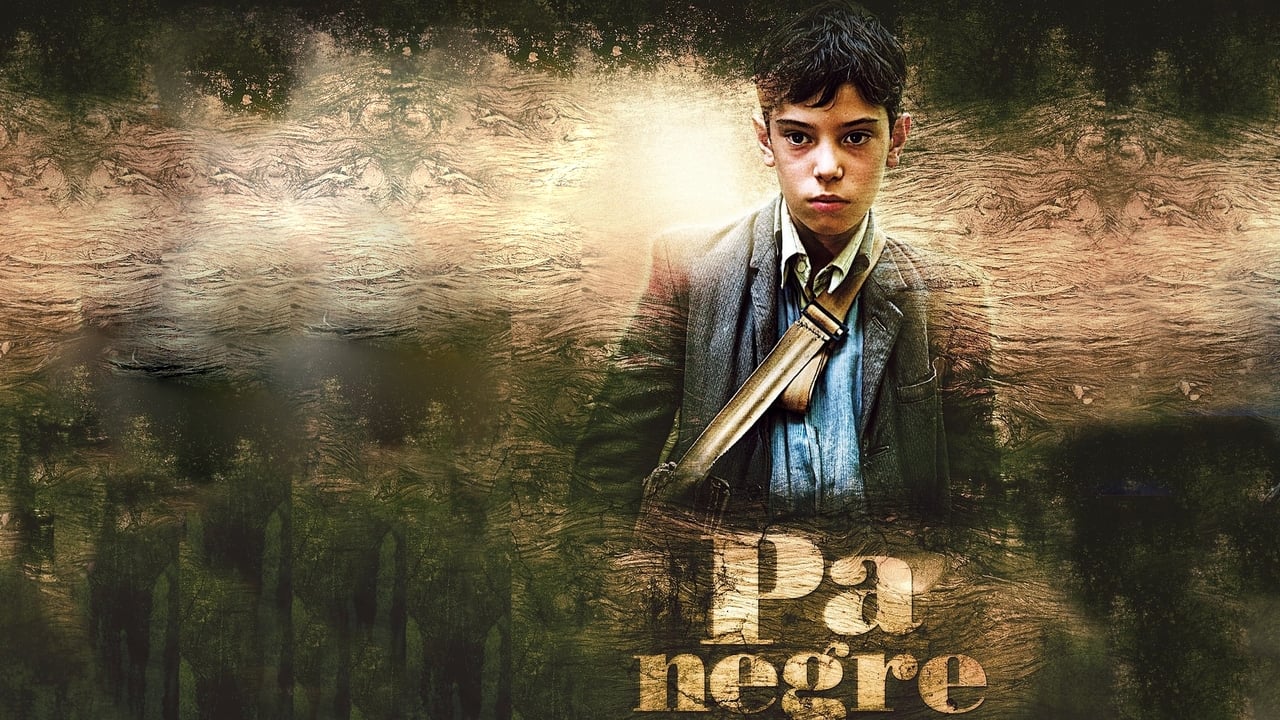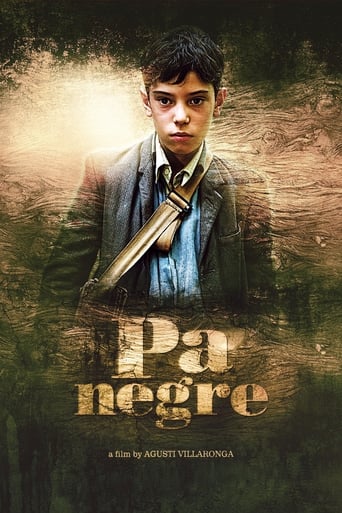



I like the storyline of this show,it attract me so much
View MoreIt is a performances centric movie
It’s fine. It's literally the definition of a fine movie. You’ve seen it before, you know every beat and outcome before the characters even do. Only question is how much escapism you’re looking for.
View MoreThe plot isn't so bad, but the pace of storytelling is too slow which makes people bored. Certain moments are so obvious and unnecessary for the main plot. I would've fast-forwarded those moments if it was an online streaming. The ending looks like implying a sequel, not sure if this movie will get one
View MorePa negre could have been an interesting movie, but it feels a bit rough around the edges as a whole. It's sort of exaggerated in its evilness, the lies are so many that it would have been impossible for the characters to remember what they had just said and to keep any kind of contact with reality. This exaggeration probably comes as an inheritance from Pan's Labyrinth, but unlike its inspiration Pan Negre lacks subtlety and magic. As for the children, they are cruel and borderline psychopaths, except for the main character who is cold enough as to avoid going crazy. The scenes which portrays animal cruelty are indeed disgusting, I hope no animal was harmed in the making of the film.
View MoreDisgusting. This film is guilty of animal cruelty. I am ashamed that it will represent my country in the Oscars. Disgusting. This film is guilty of animal cruelty. I am ashamed that it will represent my country in the Oscars. Disgusting. This film is guilty of animal cruelty. I am ashamed that it will represent my country in the Oscars.Disgusting. This film is guilty of animal cruelty. I am ashamed that it will represent my country in the Oscars.Disgusting. This film is guilty of animal cruelty. I am ashamed that it will represent my country in the Oscars.Disgusting. This film is guilty of animal cruelty. I am ashamed that it will represent my country in the Oscars.Disgusting. This film is guilty of animal cruelty. I am ashamed that it will represent my country in the Oscars.Disgusting. This film is guilty of animal cruelty. I am ashamed that it will represent my country in the Oscars.
View MoreAgustí Villaronga's 'Pa Negre' has one of the most stupendously shot and chilling opening sequences I've seen among recent films. I wasn't aware of the hype surrounding it, including the fact that it had won many Goyas. A friend had recommended this film.Set against the backdrop of postwar Catalonia, writer Emili Teixador weaves a complex tale of greed, betrayal, sacrifice and redemption. In a way, 'Pa Negre' is also a coming of age tale but a very dark one. Villaronga does an excellent job of bringing it to screen. His way of unfolding the story and uncovering the truth about the characters is done meticulously. It also provides some interesting historical insight that is less known to those not familiar with post-war Catalonia.Moreover, the look of the film is quite authentic. The feel of the time seems to have been captured very well. The village and the stunning natural locations are are very real. Cinematography, editing and lighting are superb. The performances are sincere. Young actor Francesc Colomer does a fine job in leading the film. The rest of the actors are equally compelling.'Pa Negre' opens with three brutal murders and ens with a child's realization of the dark truth that has changed him forever. Villaronga tells a disturbing tale of how war creates monsters even of those whom you've known all your life as loving beings with ideals.
View MoreAgustí Villaronga wrote and directed this austerely beautiful Catalan coming-of-age film based on a novel by Emili Teixidor with echoes of Clément's Forbidden Games and Dickens' Great Expectations and a setting -- a child's rural world during the grim days after the Spanish Civil War (1944) -- that links it with de Toro's Pan's Labyrinth. But while del Toro's film is Gothic and surreal, Teixidor's, apart dream sequences and flight metaphors, impresses in both its narrative and its imagery with a stark simplicity worthy of Italian neorealism, overlaid with greater layer of moral ambiguity. Again as in Pan's Labyringh, Sergi López plays the local fascist Alcalde, this time a less clearly sadistic one. At the center is 11-year-old Andreu (Francesc Colomer), who at the outset witnesses a shocking crime. He sees a hooded figure kill a man, toss him in a covered wagon, than blindfold the horse pulling the wagon and cast them all off a cliff with a boy inside. Andreu's father Farriol (Roger Casamajor) is suspected, perhaps because he has an anti-fascist background. Farriol goes into hiding and Andreu is sent to live with his grandmother (Elisa Crehuet) in a houseful of widows. Andreu's lean, handsome father gives his son many inspiring peptalks about keeping the moral high ground, but all the while his own character remains somewhat suspect. Eventually Andreu will also turn away even from his long- suffering mother Florencia (Nora Navas) when he is adopted by a rich, plump Miss Havisham figure, Mrs. Manubens (Merce Aranega).At school the teacher is a monomaniacal fascist drum-beater and alcoholic (Eduard Fernandez), who even sleeps with Andreu's feral, maimed but beautiful cousin Núria (Marina Comas) -- her hand has been blown up by a bomb. Yet he is not without redeeming qualities, and Fernandez conveys complexity when he advises Andreu to leave his past behind and seek a better life. Núria and Andreu become frequent companions, and roam the mysterious forest together (this is the Forbidden Games part). Here also he meets an older boy, first spotting him bathing naked in that forest, a consumptive boy (Lázaro Mur) who lives in the monastery, and who imagines he has angels' wings. The none- too-subtle bird imagery extends to a pet in a red wooden cage kept by Andreu's dad. Obviously Andreu is to fly away, and the comsumptive boy can only dream of it.It's Andreu's mother who approaches Mrs. Manubens when Farriol has been found and taken away. Not much comes of that, and Farriol is taken to Barcelona and shot, but Mrs. Manubens warms to the idea of adopting Andreu. All this happens with a kind of precipitous energy fueled by the intense but simple cinematography, the understated, compelling acting, the emotional scenes, and the prevailing sense of fear and moral ambiguity in which Andreau remarkably, with the innocence and determination of a boy, sails through unharmed, or at least capable of accepting adoption and going to a good school that will change his future. It's not necessary to undermine the rich accomplishment of Pan's Labyrinth to praise Black Bread, but it does shine forth precisely because of its simplicity and completely lack of the kind of baroque flourishes del Toro relishes. There is some strong hand-held camera work, but also smooth tracking shots. The cinematography of Antonio Riestra is classic and the editing by Raul Roman is smooth and swift. According to Jonathan Holland's review in Variety, this is Villaronga's"most mainstream film" but still "retains his trademark subversive edge." Holland also points to the way "as a depiction of rural poverty" the film is "impressive: The darkly lit, richly textured interiors seem to be an extension of the beautifully lensed natural landscape." Something about the simple dignity of the people offsets the danger and moral uncertainty of events and gives one a sense of humanistic tradition even in a world where all's gone mad and main characters like Andreu and his parents reject the comforts of religion. Black Bread/Pa negre, whose sense of style is timeless, understandably won many awards, an unusual number for a film in Catalan, both at its San Sebastián festival debut and with nine Goyas after Spanish theatrical release including best picture and best director and prizes to most of the main actors. Both Francesc Colomer, who plays the young lead and Marina Comas, who plays his cynical pal Núria, won "most promising" awards. Colomer, who is in nearly every scene, has a limpid confidence that stays with you as a memorable presence long after the final scene.The film showed earlier this year in the US at the Palm Springs festival. Seen and reviewed as part of the San Francisco International Film Festival 2011.
View More